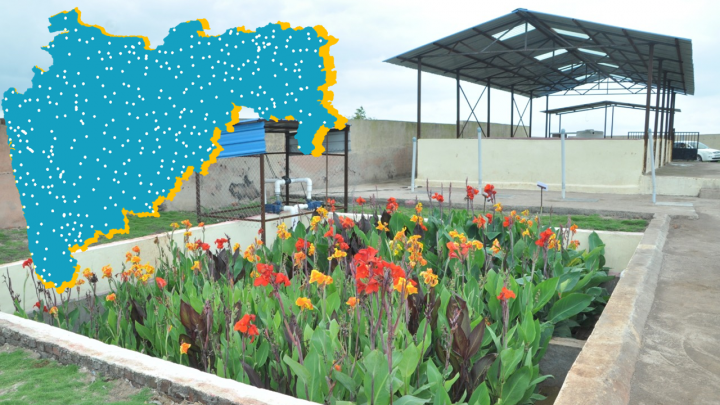Technical support to the state government of Maharashtra on urban sanitation and FSSM Providing technical support to enable the Government of Maharashtra in scaling up citywide inclusive sanitation service delivery across urban Maharashtra, focusing on introducing regular, equitable and inclusive desludging practices and ensuring treatment
Center for Water and Sanitation, CRDF, CEPT University
CWS
The State government in Maharashtra achieved Open Defecation Free status on 1st October 2017 under its Swachh Maharashtra Mission for Urban Areas (SMMUA) by making all its cities ODF. The state intends to roll out FSSM across all 393 cities in the state. In enabling Government of Maharashtra in scaling up of citywide inclusive sanitation service delivery across urban Maharashtra and ensuring the treatment of faecal sludge and septage, the following key activities have been undertaken.
Developing policies for state-wide scale-up of FSSM services with a focus on citywide and inclusive implementation of FSSM measures across cities of Maharashtra along with a strategy and investment plan for phase wise implementation to ensure sustainability. Operational guidelines and standard operating procedures for scheduled emptying and FSTP operations including model contracts were prepared.
In order to sustain the current ODF status, rollout of a state-wide comprehensive and inclusive IEC and BCC communication campaign for ODF Sustainability and FSSM is required. A Behaviour Change and communications strategy and plans were developed. Existing national and state level communication toolkits are adapted to the local context at divisions and ULBs and communication guidelines on inclusivity were integrated into the overall campaign.
A state level monitoring system and Quality Assurance framework was setup for monitoring FSSM implementation in the state. Capacity of the regional labs for effluent and output testing were done. Local institutes are being identified which will provide long term technical support to the cities through their capacity building.
Capacity building of ULBs in Maharashtra on planning, implementation and service delivery of citywide FSSM has been undertaken. This was done through training programmes. Pilot cities have been developed as models to other cities for implementation of robust business models and delivery of quality services. Model Detailed Project Reports (DPRs) and tenders across the sanitation chain which focus on inclusivity and gender integration were shared. Mechanisms of financing operations and maintenance of FSSM services are being demonstrated.
Dissemination and capacity building support to sector partners in India and globally for innovations taken up by Maharashtra for FSSM.

Mission
1. To support the state in sustaining ODF status in the cities of Maharashtra and advance towards scaling up of FSSM solutions in urban areas. 2. To strengthen the state institutions in delivery of effective sanitation services across urban Maharashtra. 3. To build capacity of the ULBs in Maharashtra and enable them to move towards citywide inclusive FSSM services. 4. To provide capacity building support to sector partners by dissemination of the innovative FSSM practices taken up by Maharashtra.Approach
Partners include Government of Maharashtra and Bill and Melinda Gates foundationFurther comments
CWAS, CEPT University - cwas@cept.ac.inGovernment resolution for ODF++
Government resolution for Co-treatment in Maharashtra
Government resolution for constructing 311 FSTPs in Maharashtra
Answer questions about the project
Dr. Meera Mehta
meeramehta@cept.ac.in
Dr. Dinesh Mehta
dineshmehta@cept.ac.in
CWAS, CRDF, CEPT University
cwas@cept.ac.in
Filter / Tags
Capacity developmentTechnology comparisonsCitiesPublic awareness, advocacy and civil society engagement Operation, maintenance and sustainable servicesBehaviour changeHealth and hygienePolitical processes and institutional aspectsSpecific to one or several countriesToilets or urinals (user interface)Emptying and transport (non sewered)Treatment of wastewater or greywaterTreatment of faecal sludgeResource recovery Enabling environment and institutional strengtheningFaecal sludge treatment processesFundamental research and engineeringBill & Melinda Gates FoundationFaeces or faecal sludgeGreywater or wastewaterUrban (entire city)Urban informal settlements (slums)EducatorsPoliticians and local decision makersPractitionersUniversity, education or research institution
Related Countries
India
Downloads
Documentation on cities sustaining ODF status
Type: application/pdf
Size: 5.26 MB
Guidelines for ULBs for implementing FSSM plan
Type: application/pdf
Size: 3.5 MB
Making Maharashtra ODF
Type: application/pdf
Size: 3.98 MB
Septage Management guidelines
Type: application/pdf
Size: 2.13 MB

Project location
